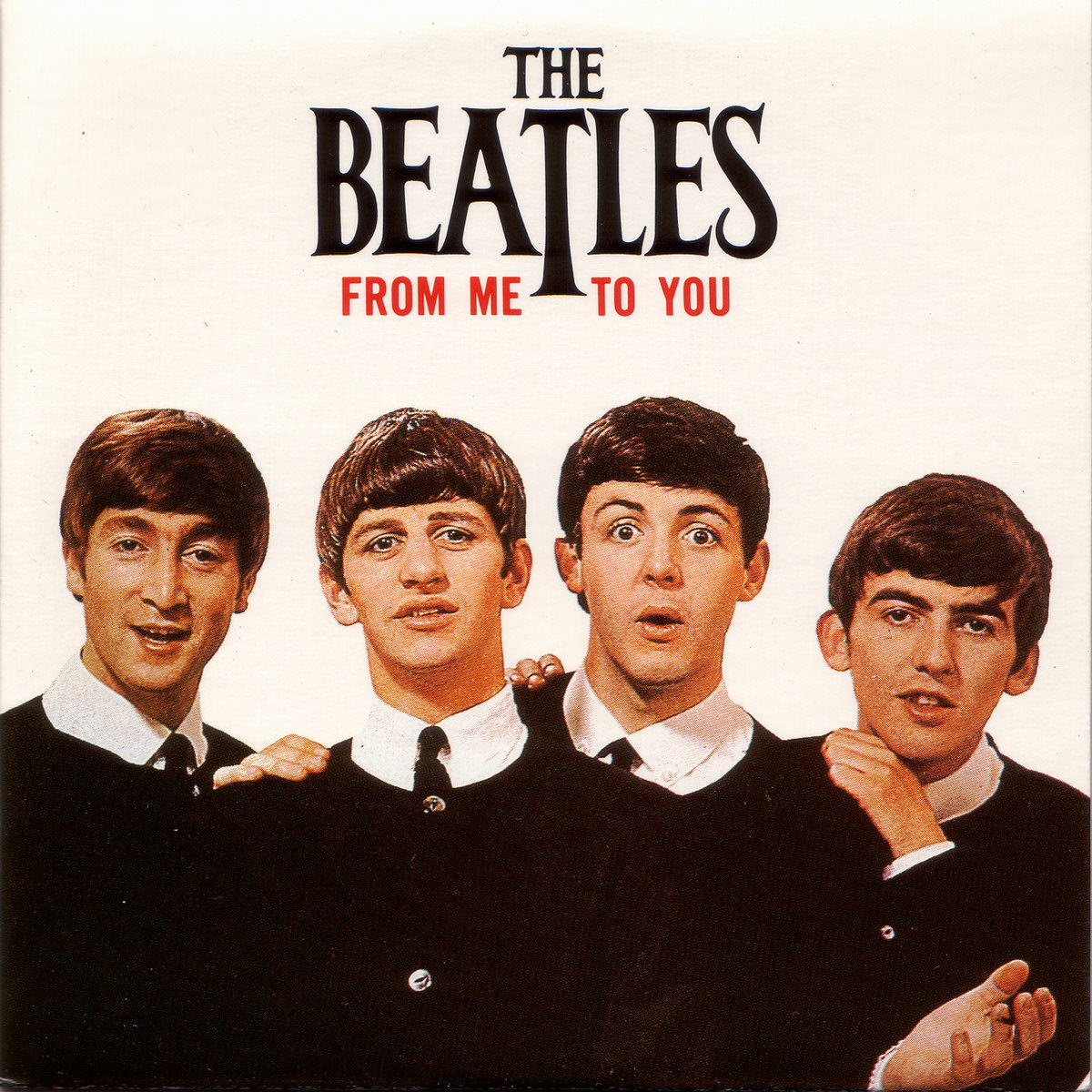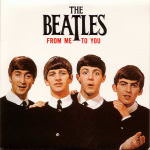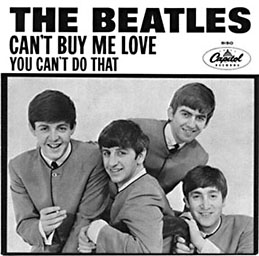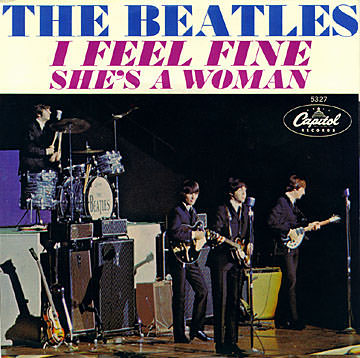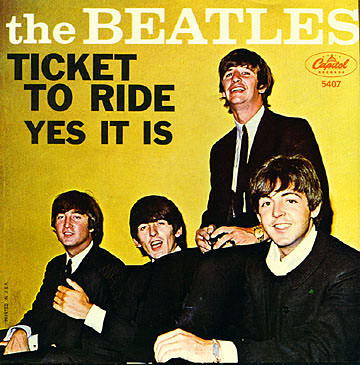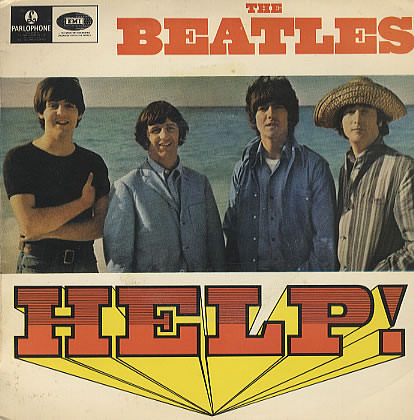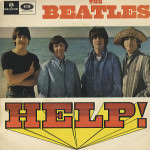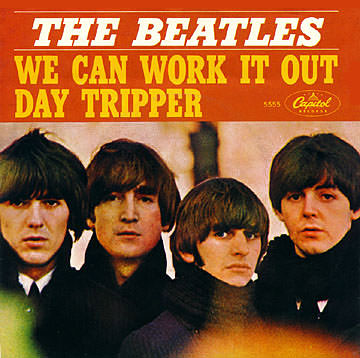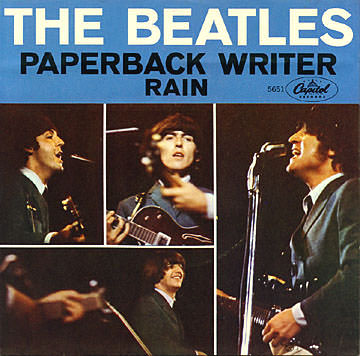From Me To You: First UK no 1
https://newslines.org/wp-content/uploads/2014/07/Single-03-From-Me-To-You-Front.jpg 1200 1200 KarenC KarenC2014-07-09 00:47:212015-12-24 17:31:53From Me To You: First UK no 1She Loves You
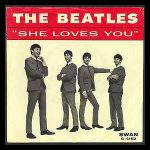 The band releases She Loves You. McCartney and Lennon were inspired to write this after a concert at the Majestic Ballroom in Newcastle when they were part of a tour with Roy Orbison and Gerry & the Pacemakers. The song is the Beatles best selling single of all time. McCartney:
The band releases She Loves You. McCartney and Lennon were inspired to write this after a concert at the Majestic Ballroom in Newcastle when they were part of a tour with Roy Orbison and Gerry & the Pacemakers. The song is the Beatles best selling single of all time. McCartney:
We were in a van up in Newcastle-Upon-Tyne. I’d planned the song where a couple of us would sing ‘She loves you’ and the other ones would answer ‘Yeah Yeah.’ We decided that was a crummy idea but at least we then had the idea of a song called She Loves You. So we sat in the hotel bedroom for a few hours and wrote it; John and I, sitting on twin beds with guitars.
I Want To Hold Your Hand
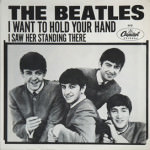 The band releases I Want To Hold Your Hand, the first track made using 4-track equipment. Lennon:
The band releases I Want To Hold Your Hand, the first track made using 4-track equipment. Lennon:
We wrote a lot of stuff together, one on one, eyeball to eyeball. Like in I Want to Hold Your Hand, I remember when we got the chord that made the song. We were in Jane Asher’s house, downstairs in the cellar playing on the piano at the same time. And we had, ‘Oh you-u-u/ got that something…’ And Paul hits this chord and I turn to him and say, ‘That’s it!’ I said, ‘Do that again!’ In those days, we really used to absolutely write like that — both playing into each other’s noses.
Can’t Buy Me Love
 The Beatles’ sixth British single, released with the b-side You Can’t Do That was written by Paul McCartney while the group were in Paris for a 19-date residency at the city’s Olympia Theatre. Can’t Buy Me Love is the first of the group’s singles to feature just one singer. The record is no 1 in the UK for 3 weeks.
The Beatles’ sixth British single, released with the b-side You Can’t Do That was written by Paul McCartney while the group were in Paris for a 19-date residency at the city’s Olympia Theatre. Can’t Buy Me Love is the first of the group’s singles to feature just one singer. The record is no 1 in the UK for 3 weeks.
A Hard Day’s Night
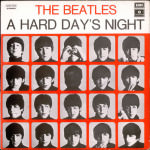 The group’s 5th No. 1 hit stays at the top of the charts for 3 weeks. The title is taken from an expression Ringo used to say. In a 1964 interview with DJ Dave Hull, Ringo explained:
The group’s 5th No. 1 hit stays at the top of the charts for 3 weeks. The title is taken from an expression Ringo used to say. In a 1964 interview with DJ Dave Hull, Ringo explained:
We went to do a job, and we’d worked all day and we happened to work all night. I came up still thinking it was day I suppose, and I said, ‘It’s been a hard day…’ and I looked around and saw it was dark so I said, ‘Night!’ So we came to ‘A Hard Day’s Night.
Time Is On My Side
The band releases, Time Is On My Side, from the album, 12 x 5. Richards:
In America we were basically known for heavy, slowish kind of ballads. Time Is On My Side, Tell Me, Heart of Stone, that was what we were known for. Strangely enough that was our thing. Every single was a slow song. Who would believe it? You’d think they’d be clamoring for out-and-out rock and roll, but no, it was the Soul ballads that happened for us in America.
I Feel Fine
 The band release I Feel Fine, the 8th British single for the band. I Feel Fine is one of the earliest examples of the use of feedback as a recording effect in popular music. The song is the first Beatles single to be released almost concurrently in the US and the UK. 1.41 million copies are sold in the UK.
The band release I Feel Fine, the 8th British single for the band. I Feel Fine is one of the earliest examples of the use of feedback as a recording effect in popular music. The song is the first Beatles single to be released almost concurrently in the US and the UK. 1.41 million copies are sold in the UK.
Ticket To Ride
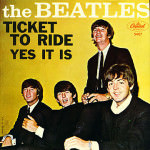 The band release Ticket To Ride. The song features a coda with a different tempo that extends the song’s length past three minutes. Lennon says this double-time section (with the lyric “My baby don’t care”) was one of his “favourite bits” in the song. The single spends 3 weeks at the top of the UK charts. Harrison:
The band release Ticket To Ride. The song features a coda with a different tempo that extends the song’s length past three minutes. Lennon says this double-time section (with the lyric “My baby don’t care”) was one of his “favourite bits” in the song. The single spends 3 weeks at the top of the UK charts. Harrison:
We are always worried with each record. With Ticket To Ride we were even more worried. There’s bound to be a time when we come in at 19 (on the charts). But this ‘number one’ business doesn’t seem to stop — great while it lasts — but now we’ll have to start all over again and people will start predicting funny things for the next one.
Help!
https://newslines.org/wp-content/uploads/2014/07/The+Beatles+-+Help+E.P.+-+7-+RECORD-114872.jpg 420 414 KarenC KarenC2014-07-09 20:14:032015-12-24 17:28:42Help!We Can Work It Out
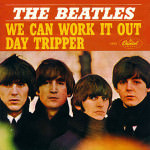 We Can Work It Out is the last of six number one singles in a row on the American charts, preceded by I Feel Fine, Eight Days a Week, Ticket to Ride, Help!, and Yesterday. This is the first double A side released single for the group, with the other A side being Day Tripper. Spends five weeks at the top of the UK charts. McCartney writes the words and music to the verses and chorus then takes the song to Lennon.
We Can Work It Out is the last of six number one singles in a row on the American charts, preceded by I Feel Fine, Eight Days a Week, Ticket to Ride, Help!, and Yesterday. This is the first double A side released single for the group, with the other A side being Day Tripper. Spends five weeks at the top of the UK charts. McCartney writes the words and music to the verses and chorus then takes the song to Lennon.
I took it to John to finish it off, and we wrote the middle together. Which is nice: ‘Life is very short. There’s no time for fussing and fighting, my friend’
Paint It Black
The band releases, Paint It Black, from, Aftermath. Richards:
We were in Fiji for about 3 days. They make sitars and all sorts of Indian stuff. Sitars are made out of watermelons or pumpkins or something smashed so they go hard. They’re very brittle and you have to be careful how you handle them. We had the sitars, we thought we’d try them out in the studio. To get the right sound on Paint It Black we found the sitar fitted perfectly. We tried a guitar but you can’t bend it enough.
Paperback Writer
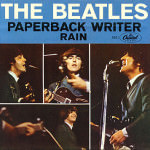 The band releases Paperback Writer. The background vocal harmonies at the beginning of the third chorus are provided by Lennon and George Harrison who sing the title of the French nursery rhyme Frère Jacques in several slow incantations. These harmonies occur at a little over one minute into the track. Lennon:
The band releases Paperback Writer. The background vocal harmonies at the beginning of the third chorus are provided by Lennon and George Harrison who sing the title of the French nursery rhyme Frère Jacques in several slow incantations. These harmonies occur at a little over one minute into the track. Lennon:
I think I might have helped with some of the lyrics. Yes, I did. But it was mainly Paul’s tune.
Eleanor Rigby
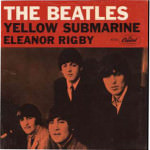 The band released Elanor Rigby. McCartney:
The band released Elanor Rigby. McCartney:
I was sitting at the piano when I thought of it. The first few bars just came to me, and I got this name in my head … “Daisy Hawkins picks up the rice in the church”. I don’t know why. I couldn’t think of much more so I put it away for a day. Then the name Father McCartney came to me, and all the lonely people. But I thought that people would think it was supposed to be about my Dad sitting knitting his socks. Dad’s a happy lad. So I went through the telephone book and I got the name “McKenzie”.
Jumpin’ Jack Flash
The band releases their song, Jumpin’ Jack Flash, from the album, Through The Past Darkly (Biggest Hits Volume I). Richards:
The lyrics came from a gray dawn at Redlands. Mick and I had been up all night, it was raining outside, and there was the sound of these boots near the window, belonging to my gardener, Jack Dyer. It woke Mick up. He said, ‘What’s that?’ I said, ‘Oh, that’s Jack. That’s jumping Jack.’ I started to work around the phrase on the guitar, which was in open tuning, singing the phrase ‘Jumping Jack.’ Mick said, ‘Flash,’ and suddenly we had this phrase with a great rhythm and ring to it.
Street Fighting Man
The band releases their song, Street Fighting Man, from the album, Beggars Banquet. Jagger:
It was a very strange time in France. But not only in France but also in America, because of the Vietnam War and these endless disruptions…. I wrote a lot of the melody and all the words, and Keith and I sat around and made this wonderful track, with Dave Mason playing the shelani on it live. It’s a kind of Indian reed instrument a bit like a primitive clarinet. It comes in at the end of the tune. It has a very wailing, strange sound.
No Expectations
The band releases their song, No Expectations, from the album, Beggars Banquet.
Stray Cat Blues
0 0 Rhonda Rhonda2014-12-02 01:31:292014-12-28 18:18:22Stray Cat BluesYou Can’t Always Get What You Want
The band releases, You Can’t Always Get What You Want, from the album, Let It Bleed. Jagger:
It’s a good song, even if I say so myself. It’s got a very sing-along chorus, and people can identify with it: No one gets what they always want. It’s got a very good melody. It’s got very good orchestral touches that Jack Nitzsche helped with. So it’s got all the ingredients.
Honky Tonk Women
The band releases their song, Honky Tonk Women, from, Let It Bleed. Richards:
Honky Tonk Women started in Brazil. Mick and I, Marianne Faithfull and Anita Pallenberg who was pregnant with my son at the time. Which didn’t stop us going off to the Mato Grasso and living on this ranch. It’s all cowboys. It’s all horses and spurs. And Mick and I were sitting on the porch of this ranch house and I started to play, basically fooling around with an old Hank Williams idea. ‘Cause we really thought we were like real cowboys. Honky tonk women. And we were sitting in the middle of nowhere with all these horses, in a place where if you flush the john all these black frogs would fly out. It was great. The chicks loved it. Anyway, it started out a real country honk put on, a hokey thing. And then couple of months later we were writing songs and recording. And somehow by some metamorphosis it suddenly went into this little swampy, black thing, a Blues thing. Really, I can’t give you a credible reason of how it turned around from that to that. Except there’s not really a lot of difference between white Country music and black Country music. It’s just a matter of nuance and style. I think it has to do with the fact that we were playing a lot around with open tunings at the time. So we were trying songs out just to see if they could be played in open tuning. And that one just sunk in.
Gimme Shelter
The band releases, Gimme Shelter, featuring Clayton, from, Let It Bleed. Jagger:
That song was written during the Vietnam War and so it’s very much about the awareness that war is always present; it was very present in life at that point. Mary Clayton who did the backing vocals, was a background singer who was known to one of the producers. Suddenly, we wanted someone to sing in the middle of the night. And she was around. She came with her curlers in, straight from bed, and had to sing this really odd lyric. For her it was a little odd – for anyone, in the middle of the night, to sing this one verse I would have been odd. She was great.
